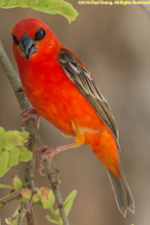
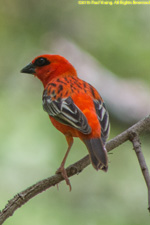
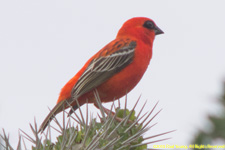
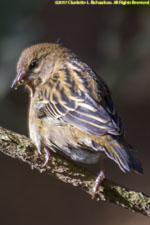
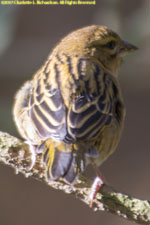
107 endemic bird species are found on Madagascar, out of 200 species total.
Fodies:
There are six species of fodies, small passerine birds related to weavers.
The Madagascar red fody (Madagascar fody, red cardinal fody, common fody), Foudia madagascariensis, is a small bird native to Madagascar and introduced to other Indian Ocean islands. It feeds mostly on seeds. The male's breeding plumage is red except for the wings and tail.
The forest fody, Foudia omissa, is native to Madagascar and is found in subtropical or moist tropical lowland forests.
The Madagascar mannikin, Lepidopygia nana, is a small finch native to Madagascar, found in subtropical and tropical dry forest, grassland, and shrub land.
The Madagascar (olive) bee-eater, Merops superciliosus, is native to the southern half of Africa, found in grasslands and coastal mountains of east Africa and Madagascar.
The Madagascar paradise flycatcher (Malagasy paradise flycatcher), Terpsiphone mutata, is found in Comoros, Madagascar, and Mayotte in subtropical or tropical dry forests and subtropical or tropical moist lowland forests. There are five subspecies. The male has two plumage morphs.
The Amber Mountain Rock-thrush, Monticola erythronotus (Monticola sharpei erythronotus) is a subspecies of the forest rock thrush, a small chat. It is endemic to Madagascar, found only on the Amber Mountain massif in the north of the island. Females are mostly brown with an orage wash on the underparts and lack the blue hood of the male.
The helmeted guineafowl, Numida meleagris, is native to Africa. They eat ticks, other small animals, and plants.
The Mascarene martin (Mascarene swallow), Phedina borbonica, breeds on Madagascar and the Mascarene Islands (Mauritius and Reunion). This small swallow nests in small colonies in tunnels and caves. It eats insects.
The Hamerkop, Scopus umbretta, is a medium-sized wading bird. It ranges from Africa south of the Sahara to Arabia.
The Madagascar magpie robin (Madagascan magpie robin), Copsychus albospecularis, is a chat, an Old World flycatcher. It is endemic to Madagascar. The male is black and white while the female is brown and white.
The purple heron, Ardea purpurea, is a wide-ranging species which breeds in Africa, central and southern Europe, and southern and eastern Asia.
The green-backed heron (striated heron), Butorides striata, is widespread throughout the Old World tropics and in South America.
The black-crowned night heron (night heron), Nycticorax nycticorax, is a medium-sized heron found throughout the world except very cold regions and Australasia. Immature birds have streaked markings.
The Squacco heron, Ardeola ralloides, is a small heron which breeds in southern Europe and the Greater Middle East and winters in Africa.
The Malagasy pond heron, Ardeola idae, is primarily found in the outer islands of the Seychelles, Madagascar, and the east coast of Africa. They breed on Madagascar.
The Dimorphic egret, Egretta dimorpha, is found in Comoros, Kenya, Madagascar, Mayotte, Seychelles, and Tanzania. There is a light (white) morph and a dark (black) morph.
The Black heron (black egret), Egretta ardesiaca, is an African heron. It uses its wings to form a canopy when fishing.
The Western cattle egret, Bubulcus ibis, is a heron species found in the tropics, subtropics, and warm temperate zones. The white bird is adorned with buff plumes during the breeding season.
The Great egret (common egret, large egret, great white egret, great white heron), Ardea alba, is a large, widely-distributed egret, found across most of the tropical and warm temperate regions. It nests in colonies in trees close to the water.
The Madagascan ibis (Madagascar crested ibis, white-winged ibis, crested wood ibis), Lophotibis cristata, is a medium-sized brown ibis with red orbital skin, yellow bill, red legs and feet, white wings, and a partially-bare head with a dense crest of green or blue and white plumes on the nape. It is one of Madagascar's largest forest birds. It is endemic. They are very wary, usually seen foraging near forest paths.
The Madagascar sacred ibis, Threshiornis bernieri, is a large, heavily-built ibis endemic to the west coast of Madagascar and to Aldabra.
The Madagascar harrier-hawk, Polyboroides radiatus, is endemic to Madagascar. They eat small birds, reptiles, insects, and small lemurs such as dwarf lemurs.
The Madagascar harrier (Malagasy harrier, Madagascar marsh harrier, Malagasy marsh harrier), Circus macrosceles, is a marsh harrier from Madagascar amd the Comoros Islands. They are found in marshlands and grasslands except in the far south and feed mainly on birds.
The Madagascan fish-eagle (Madagascar fish eagle, Madagascar sea-eagle), Haliaeetus vociferoides, is endemic to the coastal strip in the northwest of Madagascar north of Morondava. It is crtically endangered.
The Madagascan buzzard (Madagascar buzzard), Buteo brachypterus, is endemic to Madagascar. It is found in a wide variety of habitats, but is less common in the deforested central plateau.
The Banded kestrel (Madagascar banded kestrel, barred kestrel, Madagascar barred kestrel), Falco zoniventris, is endemic to Madagascar. It is fairly common in the south and west.
The Madagascar kestrel (Malagasy kestrel, Malagasy spotted kestrel, Newton's kestrel, Madagascar spotted kestrel, katiti, hitsikitsika), Falco newtoni, is a small kestrel found on Madagascar and Aldabra as well as Mayotte and the Comoros.
The Frances's sparrowhawk, Accipter francesiae, is a small bird of prey endemic to Madagascar. They live on the edges of forests.
The Common sandpiper, Actitis hypoleucos, breeds across most of temperate and subtropical Europe and Asia and migrates to Africa, southern Asia, and Australia in winter.
The Terek sandpiper, Xenus cinereus, is a small migratory wader, slightly larger than the common sandpiper, with an upturned bill. They breed in the taiga forest of Finland through northern Siberia and migrate south in the winter to tropical coasts in east Africam South Asia, and Australia.
The Black-winged stilt, Himantopus himantopus, is a widely-distributed avocet found in Europe and Africa.
The Three-banded plover, Charadrius tricollaris, is found in much of eastern and southern Africa and Madagascar.
The Saunders' tern, Sterna saundersi, is found in Bahrain, Iran, Israel, Kenya, Madagascar, Pakistan, Oman, Saudi Arabia, Sri Lanka, Tanzania, United Arab Emirates, and Yemen.
The Brown booby, Sula leucogaster, breeds on pan-tropical islands and coasts. They winter at sea over wider areas.
The Malagasy turtle dove (Madagascar turtle dove), Nesoenas picturata, is found in the British Indian Ocean Territory, Comoros, Madagascar, Mauritius, Mayotte, Reunion, and Seychelles.
The Namaqua dove, Oena capensis, is a small pigeon with a long tapered tail. It is widespread in sub-Saharan Africa and Madagascar, the Arabian Peninsula, southern Israel, Jordan, and Turkey. It is found in the acacia desert.
The Madagascan green pigeon, Treron australis, is found in Madagascar, Comoros, and Mayotte.
Madagascar blue pigeon, Alectroenas madagascariensis
The Madagascar sandgrouse (Madagascan sandgrouse), Pterocles personatus, is endemic to Madagascar. It is a ground-dwelling, short-legged, plump bird.
The Malagasy kingfisher (Madagascar kingfisher), Corythornis vintsoides, is found in Madagascar, Mayotte, and Comoros in subtropical or tropical mangrove forests. It is closely related to the malachite kingfisher of mainland Africa.
Madagascar kingfisher courtship.
The Madagascan hoopoe, Upupu epops marginata, is endemic to Madagascar. Its habitat is subtropical or tropical dry forests.
The Greater vasa parrot, Coracopsis vasa, is found throughout Madagascar and Comoros.
The Lesser vasa parrot (black parrot), Coracopsis nigra, is native to Comoros, Madagascar, Mayotte, and Seychelles. They live in mangrove swamps and evergreen forests and eat seeds, blossoms, and fruit.
The Grey-headed lovebird (Madagascar lovebird), Agapornis canus, is a small parrot or lovebird. Only the adult male has has grey on its upper body. They are native to Madagascar and are the smallest lovebird species.
The Pied crow, Corvus albus, is a wide-distributed African crow. They inhabit mainly open country with villages and towns nearby.
The Common myna (Indian mynah, Indian myna), Aeridotheres tristis, is native to Asia. It is an omniverous open woodlands bird. It is viewed as an invasive species.
The Sakalava weaver (Sakalava fody), Ploceus sakalava, is endemic to Madagascar. It inhabits the dry lowland forests and scrubland of the north, west, and south of Mdagascar. The adult male has a yellow head and upper breast during breeding season.
The Yellow-billed kite, Milvus aegyptius, is found throughout suib-Saharan Africa and Madagascar. They eat small vertebrates and insects.
The Black kite, Milvus migrans, is the most abundant species of kite. They are oopurtunistic hunters and scavengers.
Madagascar scops owl (rainforest scops owl, Malagasy scops owl), Otus rutilus, is found in a large part of eastern Madagascar and Seychelles in subtropical or tropical moist lowland forests and subtropical or tropical moist montane forests.
The Western barn owl, Tyto alba, is native to Eurasia and Africa. It lives in open farmland or grassland with some interspersed woodlands.
The Madagascar nightjar (Madagascan nightjar), Caprimulgus madagascariensis, is found in Madagascar and Seychelles in subtropical or tropical moist lowland forests and subtropical or tropical moist montane forests.
The Crested drongo, Dieruruius fortificatus, is found in Madagascar and Comoros in lowland forests, both dry and humid, and open savannah country. Adult birds have a forked tail.
The Common jery, Neomixis tenella, is endemic to Madagascar in subtripical or tropical dry forests and subtropical or tropical moist lowland forests.
Couas are large, mostly terrestrial birds of the cuckoo family, endemic to Madagascar. There are nine species. All have featherless blue skin around their eyes and long, broad tails.
The Crested coua, Coua cristata, is endemic to forests, savannahs, and brushlands of Madagascar from sea level to 900 meters.
The Giant coua, Coua gigas. is endemic to the dry forests of western and southern Madagascar.
The Broad-billed (cinnamon, African broad-billed) roller, Eurystomus glaucurus, breeds across tropical Africa and Madagascar in all but the driest regions in the wet season and migrates from the northern and southern areas of its range towards the moister equatorial belt in the dry season.
Roller in flight
The Madagascar cuckoo-roller (coural), Leptosomus discolor, lives in forested woodlands in Madagascar and Comoros.
The Madagascar coucal (Malagasy coucal), Centropus toulou, is a cuckoo found in the Comoros, Mayotte, and Madagascar.
The Madagascar green sunbird (Malagasy green sunbird, long-billed green sunbird), Cinnyris notatus, is found in the Comoros, Mayotte, and Madagascar.
The Souimanga sunbird, Cinnyris souimanga, is native to Madagascar, Glorioso, and Comoros.
The Madagascar grebe, Tachybaptus pelzelnii, is found only in western and southern Madagascar. It prefers shallow freshwater lakes and pools with dense lily pads.
The Fulvous whistling duck (fulvous tree duck), Dendrocygna bicolor, breeds across the world's tropical regions. It prefers shallow lakes, paddy fields, or other wetlands with plentiful vegetation.
The White-faced whistling duck, Dendrocygna viduata, breeds in sub-Saharan Africa and much of South America. They are gregarious and form large flocks.
The Knob-billed duck (African comb duck), Sarkidiornis melanotos, is found in tropical wetlands in sub-Saharan Africa, Madagascar, and South Asia from Pakistan to Laos and extreme southern China. The much-larger male has a large black knob on it sbill.
The Allen's gallinule, Porphyrio alleni, is a small rail which breeds in marshes and lakes in sub-Saharan Africa. Breeding males have a blue frontal shield, which is green in the females.
The Common moorhen (waterhen, swamp chicken), Gallinula chloropus, is a rail which is dsitributed across many parts of the Old World in well-vegetated marshes, ponds, canals, and other wetlands.
The Madagascar wagtail, Motacilla flaviventris, is a wagtail endemic to Madagascar and is found throughout the island, usually around water.
Vangas are small-to-medium sized shrike-like birds endemic to Madagascar.
The helmet vanga, Euryceros prevostii, has a large bill with a casque on top. It is found in the lowlands and lower montane forests of northeastern Madagascar. The bird on the left is a juvenile.
The hook-billed vanga, Vanga curvirostris, is found in tropical or subtropical dry or moist forest. It is relatively common.
We have been unable to identify these birds, all shot in Ankarana east during the dry (winter) season. If you can identify them, or if we have misidentified any of the others, please contact us and we will correct them. They may be forest fody (Foudia omissa) males in non-breeding plumage.
©2016, 2017, 2018, 2019, 2020, 2024 Mermaid Underwater Photographic. All Rights Reserved.
Contact us at mermaid@underwater.org.
Last modified 24 June 2024